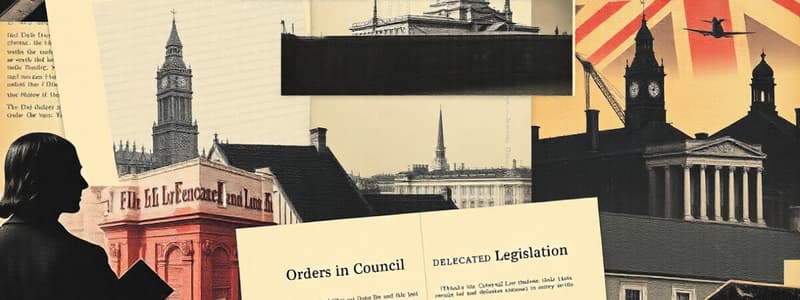Podcast
Questions and Answers
Which of the following scenarios best exemplifies delegated legislation?
Which of the following scenarios best exemplifies delegated legislation?
- The Supreme Court interprets a vaguely worded clause in a recently passed Act of Parliament.
- A local council proposes a new bill to Parliament for consideration.
- Parliament debates and passes a comprehensive law on environmental protection.
- A government minister issues specific regulations regarding pollution limits, based on the framework of an existing environmental protection law passed by Parliament. (correct)
What distinguishes an Order in Council from a statutory instrument?
What distinguishes an Order in Council from a statutory instrument?
- Orders in Council are made by local authorities, while statutory instruments are issued by government ministers.
- Orders in Council are made by the Queen and the Privy Council, often dealing with matters like transferring responsibilities between government departments, while statutory instruments are rules made by government ministers. (correct)
- Orders in Council require affirmative resolution, while statutory instruments are subject to negative resolution.
- Orders in Council are subject to judicial review, while statutory instruments are not.
A local council wants to ban the consumption of alcohol in a specific public park. Which type of delegated legislation would they likely use to enact this?
A local council wants to ban the consumption of alcohol in a specific public park. Which type of delegated legislation would they likely use to enact this?
- Order in Council
- Affirmative Resolution
- Statutory Instrument
- Bylaw (correct)
Which of the following statements accurately describes the role of the Delegated Powers Scrutiny Committee?
Which of the following statements accurately describes the role of the Delegated Powers Scrutiny Committee?
What is the primary difference between an affirmative resolution and a negative resolution in the context of delegated legislation?
What is the primary difference between an affirmative resolution and a negative resolution in the context of delegated legislation?
Which of the following is an example of procedural ultra vires in the context of delegated legislation?
Which of the following is an example of procedural ultra vires in the context of delegated legislation?
In the context of judicial review, what does 'substantive ultra vires' refer to?
In the context of judicial review, what does 'substantive ultra vires' refer to?
What principle is being applied when a court declares a piece of delegated legislation 'Wednesbury unreasonable'?
What principle is being applied when a court declares a piece of delegated legislation 'Wednesbury unreasonable'?
Which of the following is NOT typically considered an advantage of delegated legislation?
Which of the following is NOT typically considered an advantage of delegated legislation?
Which of the following represents a disadvantage of Delegated Legislation?
Which of the following represents a disadvantage of Delegated Legislation?
What is meant by 'sub-delegation' in the context of delegated legislation?
What is meant by 'sub-delegation' in the context of delegated legislation?
The Legislative and Regulatory Reform Act 2006 grants ministers the power to make provisions by order. What main purpose does this serve?
The Legislative and Regulatory Reform Act 2006 grants ministers the power to make provisions by order. What main purpose does this serve?
Which statement is most accurate regarding the controls Parliament exercises over delegated legislation?
Which statement is most accurate regarding the controls Parliament exercises over delegated legislation?
What is the significance of 'locus standi' in the context of judicial review of delegated legislation?
What is the significance of 'locus standi' in the context of judicial review of delegated legislation?
Why might the limited availability of legal aid be considered a disadvantage in challenging delegated legislation?
Why might the limited availability of legal aid be considered a disadvantage in challenging delegated legislation?
A new regulation regarding food safety standards is introduced via a statutory instrument. Before it's implemented, the government seeks feedback from food manufacturers and consumer groups. Which control measure is being applied?
A new regulation regarding food safety standards is introduced via a statutory instrument. Before it's implemented, the government seeks feedback from food manufacturers and consumer groups. Which control measure is being applied?
What is the most likely reason that Parliament would choose to delegate legislative power rather than create an Act of Parliament?
What is the most likely reason that Parliament would choose to delegate legislative power rather than create an Act of Parliament?
How does publicity serve as a control mechanism over delegated legislation?
How does publicity serve as a control mechanism over delegated legislation?
In what circumstance might an Order in Council be used instead of a typical Act of Parliament?
In what circumstance might an Order in Council be used instead of a typical Act of Parliament?
Given that the Scrutiny Committee reviews statutory instruments, what is a limitation on their power?
Given that the Scrutiny Committee reviews statutory instruments, what is a limitation on their power?
What is a key difference in how affirmative and negative resolutions are handled in Parliament?
What is a key difference in how affirmative and negative resolutions are handled in Parliament?
What is the primary drawback of the 'repeal of enabling act' as a parliamentary control over delegated legislation?
What is the primary drawback of the 'repeal of enabling act' as a parliamentary control over delegated legislation?
A government minister makes a statutory instrument that appears to contradict the original intention of the enabling Act. Which control might be most effective in addressing this?
A government minister makes a statutory instrument that appears to contradict the original intention of the enabling Act. Which control might be most effective in addressing this?
A local authority introduces a bylaw without consulting local residents, even though the enabling Act requires such consultation. What legal challenge could arise?
A local authority introduces a bylaw without consulting local residents, even though the enabling Act requires such consultation. What legal challenge could arise?
Why could obscure wording in delegated legislation be considered a disadvantage?
Why could obscure wording in delegated legislation be considered a disadvantage?
Under what grounds can delegated legislation be challenged as 'Wednesbury unreasonable'?
Under what grounds can delegated legislation be challenged as 'Wednesbury unreasonable'?
What is a likely consequence of delegated legislation lacking sufficient publicity?
What is a likely consequence of delegated legislation lacking sufficient publicity?
A government minister consults with industry experts before drafting new environmental regulations under an existing Act of Parliament. What control measure does this demonstrate?
A government minister consults with industry experts before drafting new environmental regulations under an existing Act of Parliament. What control measure does this demonstrate?
A railway company wants to introduce a bylaw that prohibits passengers from using e-cigarettes on station platforms. Which requirement must they meet for this bylaw to be valid?
A railway company wants to introduce a bylaw that prohibits passengers from using e-cigarettes on station platforms. Which requirement must they meet for this bylaw to be valid?
Flashcards
Delegated legislation
Delegated legislation
Law made by a person/body other than Parliament, but with Parliament's authority, usually defined in a 'parent' Act.
Orders in Council
Orders in Council
A form of delegated legislation made by the Queen and Privy Council, allowing government to make laws without parliamentary debate.
Statutory Instruments
Statutory Instruments
Rules and regulations made by government ministers, each dealing with policy in their department.
Bylaws
Bylaws
Signup and view all the flashcards
Legislative and Regulatory Reform Act 2006
Legislative and Regulatory Reform Act 2006
Signup and view all the flashcards
Delegated Powers Scrutiny Committee
Delegated Powers Scrutiny Committee
Signup and view all the flashcards
Pre-drafting consultation
Pre-drafting consultation
Signup and view all the flashcards
Affirmative Resolution
Affirmative Resolution
Signup and view all the flashcards
Negative Resolution
Negative Resolution
Signup and view all the flashcards
Scrutiny Committee
Scrutiny Committee
Signup and view all the flashcards
Procedural ultra vires
Procedural ultra vires
Signup and view all the flashcards
Substantive ultra vires
Substantive ultra vires
Signup and view all the flashcards
Reasonableness
Reasonableness
Signup and view all the flashcards
Locus standi
Locus standi
Signup and view all the flashcards
Study Notes
- Delegated legislation is law made by a person or body other than Parliament, but with its authority.
- This authority originates from a 'parent' Act of Parliament, known as an enabling Act.
- The enabling Act sets out the framework of the law and delegates power to others to make more detailed regulations.
Orders in Council
- Orders in Council are made by the Queen and the Privy Council.
- The Privy Council consists of the prime minister and other leading government members.
- Orders in Council allow the government to legislate without parliamentary debate or vote.
- They address a wide range of matters, including:
- Transferring responsibility between government departments.
- Bringing Acts of Parliament into force.
- Making law in emergencies under the Civil Contingencies Act 2004.
Statutory Instruments
- Statutory instruments are rules and regulations made by government ministers.
- Government ministers are authorized to make these regulations within their department's policy area.
- Statutory instruments can be short, like annual minimum wage changes.
- Some may be long and detailed, such as The Chemicals Regulations 2009.
- Police codes of practice regarding stop and search, arrest, and detention are statutory instruments.
Bylaws
- Bylaws are made by local authorities for local matters.
- County councils can pass bylaws for the entire county.
- District and town councils can make bylaws for their specific district or town.
- Many local bylaws address traffic control, like parking restrictions.
- Bylaws can regulate behavior, like banning drinking in public or cycling in parks.
- Public corporations and certain companies use bylaws to enforce rules within their jurisdiction.
- The British Airports Authority and railway companies make rules about public behavior on their premises.
Legislative and Regulatory Reform Act 2006
- The Legislative and Regulatory Reform Act 2006 allows ministers to make provisions by order.
- This is permissible if it removes or reduces a 'burden' resulting from legislation.
Parliamentary Control over Delegated Legislation
- Parliament can repeal the powers in the enabling Act, ending the right to make further regulations.
- The Delegated Powers Scrutiny Committee in the House of Lords reviews Bills for inappropriate delegation of legislative power.
- Parliament has several ways to oversee delegation:
- Pre-drafting consultation: Government departments consult interested parties when drafting regulations (but are not required to act on the feedback).
- Affirmative resolutions: Statutory instruments require specific parliamentary approval to become law and must be debated.
- Negative resolutions: Statutory instruments become law unless rejected by Parliament within 40 days.
- Scrutiny Committee: Reviews all statutory instruments, raising concerns to both Houses of Parliament.
- Questioning: MPs can question ministers about proposed regulations.
- Publicity: Ensures delegated legislation is published for public comment before it becomes law.
Judicial Review
- Judicial review actions are taken in the Queen's Bench Division of the High Court.
Procedural Ultra Vires
- Procedural ultra vires concerns the process of making delegated legislation.
- Delegated legislation made without following the correct procedure is ultra vires and void.
- In Agricultural Horticultural and Forestry Training Board v Aylesbury Mushrooms Ltd, failure to consult the Mushroom Growers' Association made an order establishing a training board invalid for mushroom growers.
Substantive Ultra Vires
- Substantive ultra vires concerns whether the content of the delegated legislation is within the limits of the parent Act.
- Delegated legislation exceeding those limits is ultra vires and void.
- In R v Home Secretary, ex parte Fire Brigades Union, changes made by the Home Secretary to the Criminal Injuries Compensation Scheme exceeded the power in the Criminal Justice Act 1988.
Reasonableness
- Delegated legislation can be deemed 'Wednesbury unreasonable' if the rules are manifestly unjust, made in bad faith, or perverse.
- In R (Rogers) V Swindon NHS Trust, the Court of Appeal held the 'exceptionality' review meaningless and the decision irrational.
Parliamentary Control Limits
- Pre-drafting consultation is not always carried out.
- Repealing the enabling act is impractical because laws still need to be made.
- The Delegated Powers Scrutiny Committee lacks the power to amend legislation; not all regulations need to be laid before them.
- Affirmative Resolution takes up Parliamentary time and Parliament can't amend, only approve, annul, or withdraw.
- Negative resolution depends on someone seeing the proposal and questioned by MPs in Parliament.
- Scrutiny Committee is more effective and it sees all Statutory Instruments but a technical review. They can only report back, no power to alter statutory instruments. The review is technical one and not based on policy.
- The public may not know of the existence of delegated legislation due to lack of publicity.
Judicial Review Limits
- Challenges require locus standi: actions for Judicial review will be taken in the Queens Bench Division of the High Court. It can only be taken by a person or body with locus standi or an interest in the proceedings. Locus standi will be decided as a preliminary matter, before the main issues in the case are considered.
- It is expensive and technical.
- Legal advice is necessary, and there is no legal aid funding available to challenge delegated legislation.
- The public may not know delegated legislation can be challenged this way.
Advantages of Delegated Legislation
- Time-saving: It is quicker to pass and amend.
- Policy over detail: MPs can focus on wider issues.
- Speed: It allows for quick responses in emergencies.
- Expertise: Parliament might lack technical knowledge, and local bodies can address local issues.
- Flexibility: It can be easily amended or revoked.
- Controls: There is both parliamentary and judicial oversight.
- It allows for consultation.
Disadvantages of Delegated Legislation
- It takes law-making away from the democratically elected House of Commons.
- Sub-delegation: Law-making authority may be handed down another level.
- Delegated legislation contains obscure wording.
- There is little control over non-elected people.
- There is such a large amount of delegated legislation that it is difficult to find out what the current law is.
- There is a lack of publicity.
Legislative and Regulatory Reform Act 2006 Details
- Ministers must consult various people and organisations.
- Orders made under this Act must be laid before Parliament.
- Controls are important, as the Act gives ministers broad powers to amend Acts of Parliament without detailed debate.
Studying That Suits You
Use AI to generate personalized quizzes and flashcards to suit your learning preferences.




